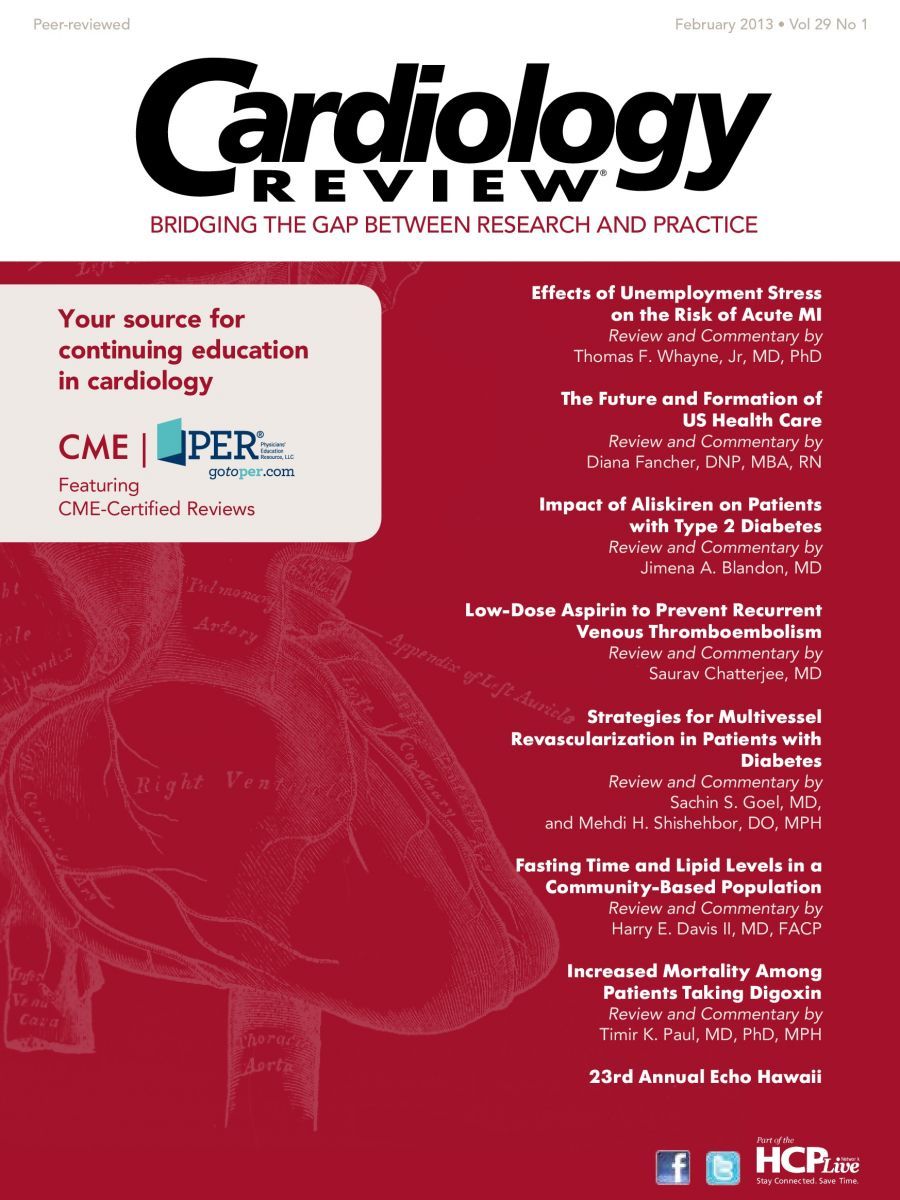Publication
Article
Cardiology Review® Online
Low-Dose Aspirin to Prevent Recurrent Venous Thromboembolism
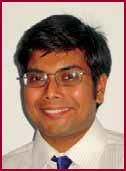
Saurav Chatterjee, MD
Review
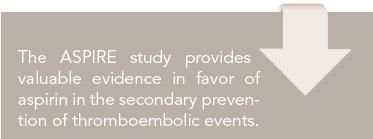
The ASPIRE (Aspirin to Prevent Recurrent Venous Thromboembolism [VTE]) study is an interesting study that evaluated whether treatment with low-dose aspirin reduces recurrence of thromboembolic events compared with placebo among patients with unprovoked prior VTE who completed initial anticoagulation therapy.1
In its updated guidelines, the American College of Chest Physicians (ACCP) recommends aspirin as one option for preventing VTE after orthopedic surgery.2 Although aspirin has been shown to be effective in the primary prevention of thromboembolism,3 in the presence of effective anticoagulants, aspirin has never gained prominence as a first-line agent for secondary prevention of thromboembolic events. ASPIRE authors Brighton et al hypothesized that lowdose aspirin would prevent recurrent VTE.
Patients who had a first episode of unprovoked VTE and completed initial anticoagulation therapy were randomized to aspirin 100 mg daily (n = 411) versus placebo daily (n = 411). The duration of the initial anticoagulation therapy had to be between 6 weeks and 24 months, determined by the treating physician on an individual basis; however, it was recommended that a target international normalized ratio of 2 to 3 be maintained with warfarin therapy for 6 to 12 months. Overall, 822 patients were randomized. The mean age was 55 years; 45% were women, and 39% had a body mass index ≥30 kg/m2. The index events were proximal deep vein thrombosis in 57% of patients, pulmonary embolism only in 27% of patients, and both in 14%. The duration of anticoagulation therapy prior to enrollment was 3 to <6 months in 28%, 6 to <12 months in 63%, and ≥12 months in 8%. At a median followup of 37.2 months, the primary outcome of recurrent VTE occurred in 14% of the aspirin group versus 18% of the placebo group (P = 0.09).
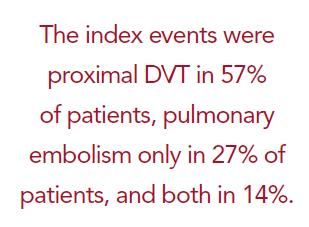
The following individual outcomes are reported as percentage per year for aspirin versus placebo groups:
• Major vascular events: 5.2% versus 8.0% (P = 0.01)
• Major bleeding and clinically relevant non-major bleeding: 1.1% versus 0.6% (P = 0.22)
• Major vascular event, major bleeding, or all-cause mortality: 6.0% versus 9.0% (P = 0.01).
As per prior plan of analysis to achieve greater power (the rate of enrollment in the ASPIRE trial was slower than anticipated), the authors found that upon pooling the results of the largely similar ASPIRE and WARFASA4 trials, aspirin was associated with a 32% reduction in the rate of recurrence of VTE (P = 0.007) and a 34% reduction in major vascular events (P = 0.002), with no increase in clinically relevant bleeding (P = 0.31).
References
1. Brighton TA, Eikelboom JW, Mann K, et al; ASPIRE Investigators. Low-dose aspirin for preventing recurrent venous thromboembolism. N Engl J Med. 2012;367:1979-1987.
2. Falck-Ytter Y, Francis CW, Johanson NA, et al. Prevention of VTE in orthopedic surgery patients: Antithrombotic therapy and prevention of thrombosis, 9th ed. American College of Chest Physicians evidence-based clinical practice guidelines. Chest. 2012;141(suppl):e278Se325S.
3. Antiplatelet Trialists’ Collaboration. Collaborative overview of randomised trials of antiplatelet therapy: III: Reduction in venous thrombosis and pulmonary embolism by antiplatelet prophylaxis among surgical and medical patients. BMJ. 1994;308:235-246.
4. Becattini C, Agnelli GA, Schenone A, et al. Aspirin for preventing the recurrence of venous thromboembolism. N Engl J Med. 2012;366:1959-1967.
5. Seshasai SR, Wijesuriya S, Sivakumaran R, et al. Effect of aspirin on vascular and nonvascular outcomes: meta-analysis of randomized controlled trials. Arch Intern Med. 2012;172:209-216.
6. Warkentin TE. Aspirin for dual prevention of venous and arterial thrombosis. N Engl J Med. 2012;367:2039-2041.
7. Lim GB. Venous thromboembolism: Aspirin ASPIREs to reduce vascular events after VTE [published online November 20, 2012]. Nat Rev Cardiol. doi: 10.1038/nrcardio.2012.168.
8. Watson HG, Chee YL. Aspirin and other antiplatelet drugs in the prevention of venous thromboembolism. Blood Rev. 2008;22:107-116.
Commentary Aspirin in Secondary Prevention of Thromboembolic Events
The ASPIRE study provides valuable evidence in favor of aspirin in the secondary prevention of thromboembolic events. However, several issues merit discussion.
• Twenty-two percent of the randomized population (15% in the aspirin arm) were nonadherent to their prescribed medication. The authors adjusted for the rate of nonadherence and actually showed that the anticipated benefits with aspirin use in a completely adherent population would likely be even better (relative risk reduction of 33% for the primary end point with adjustment, over 26% without statistical adjustments). However, a high rate of bleeding and GI toxicity being the major reasons for the discontinuation of aspirin does raise concerns about the acceptability of the treatment in a real-world population. In addition, the fact that the benefits of aspirin in reducing in cardiovascular risk may be offset by clinically important bleeding events5 may necessitate that treatment decisions be considered on a case-bycase basis.
• Real-world applicability of the trial data has been nicely summarized by Warkentin’s editorial accompanying the study6:
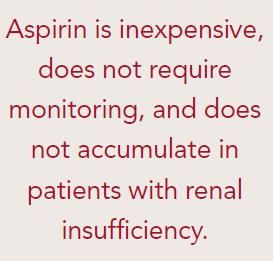
“Before physicians consider prescribing aspirin for patients who have had acute unprovoked venous thromboembolism, it is important that they treat the patients with effective anticoagulation for at least 3 months, to avoid the high risk of early recurrence. For patients who then wish to stop anticoagulation, a switch to aspirin at a dose of 100 mg daily will reduce by one third the risk of recurrent venous thromboembolism, as well as of arterial cardiovascular events, and may also attenuate the early burst of thrombosis recurrence after cessation of oral anticoagulation. Aspirin is inexpensive, does not require monitoring (in contrast to warfarin), and does not accumulate in patients with renal insufficiency (in contrast to dabigatran and rivaroxaban); in addition, if major bleeding occurs or the patient requires urgent surgery, the antiplatelet effects of aspirin can be reversed with transfusion of platelets. Among patients with unprovoked venous thromboembolism who have completed initial anticoagulation, aspirin would seem to be a reasonable option for long-term dual prevention of recurrent venous thromboembolism and arterial cardiovascular events.”
• Considering that long-term therapy with a vitamin K antagonist such as warfarin may reduce VTE recurrence but is associated with an increased risk of bleeding suggests that the data from the ASPIRE trial present aspirin as an effective and attractive alternative.7
In summary, in the ASPIRE study, aspirin as compared with placebo did not significantly reduce the rate of recurrence of VTE but resulted in a significant reduction in the rate of major vascular events, with improved net clinical benefit. These results substantiate earlier evidence8 of a possible therapeutic benefit of aspirin when given to patients after initial anticoagulant therapy for a first episode of unprovoked VTE.
About the Author
Saurav Chatterjee, MD, is Clinical and Research Fellow in Preventive Cardiology and Outcomes Research at Brown University and Providence VAMC in Providence, RI. He graduated from Calcutta National Medical College with honors and was a Resident in cardiology in Mercy Hospital, Kolkata, India, as well as trial coordinator of the CRESCENDO trial in Kolkata, India. He recently completed his residency in Internal Medicine from Maimonides Medical Center in Brooklyn, NY. Dr Chatterjee is the recipient of the 2012 Young Investigator Award for Health Outcomes and Population Genetics at the Annual Scientific Sessions of the American College of Cardiology 2012 in Chicago, and also the 2011 American Association of Cardiologists of Indian Origin (AACIO) Young Investigator Award for Interventional Cardiology and Electrophysiology. He will be joining the St Luke’s Roosevelt Hospital of Columbia University of Physicians and Surgeons in 2013 for a clinical Cardiology fellowship.
Brighton TA, Eikelboom JW, Mann K, et al. Lowdose aspirin for preventing recurrent venous thromboembolism. N Engl J Med. 2012;267:1979- 1987.
